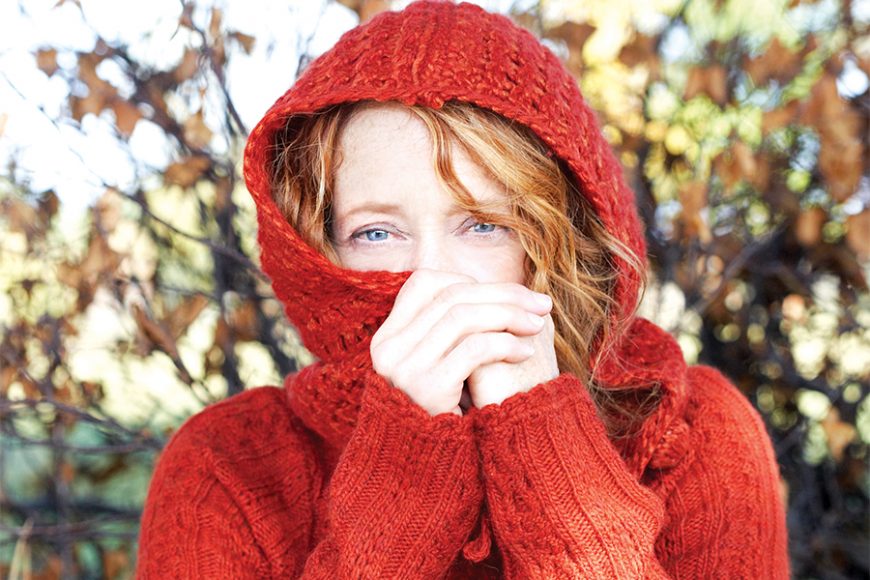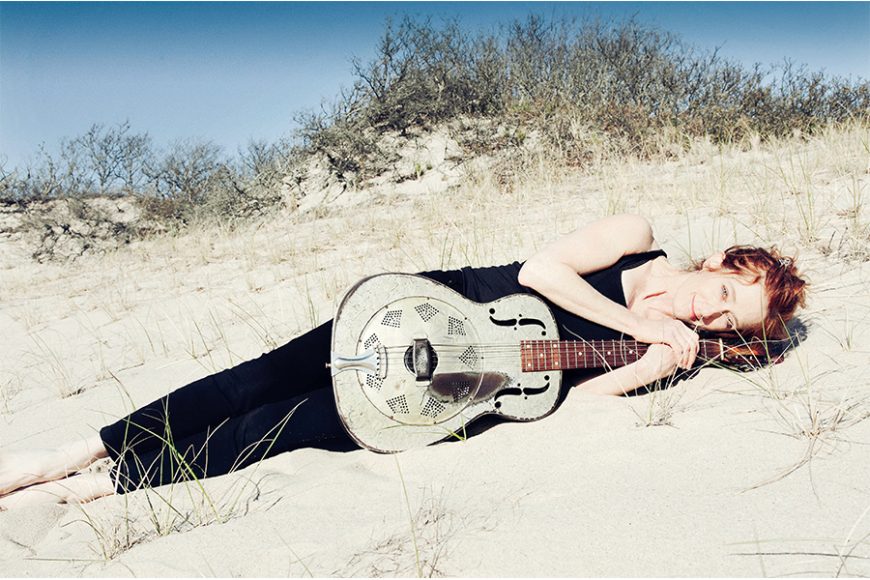Singer/songwriter Patty Larkin has some anniversaries to celebrate.
First is the 35th anniversary of the release of her first album, 1985’s “Step Into the Light,” as well as the 10th year anniversary of 2010’s “25,” a double disc set on which she teamed up with an amazing array of guest artists, including Dar Williams, Janis Ian, Suzanne Vega, Rosanne Cash, Jonatha Brooke, Merrie Amsterburg, Bruce Cockburn and others. Additionally, Larkin is continuing the 25th anniversary “On a Winter’s Night Tour” with fellow singer/songwriters Christine Lavin, Cheryl Wheeler, John Gorka and Cliff Eberhardt. Larkin also has cause for celebration because her new album, “Bird In A Cage” (Road Narrows Records) — in which she set poems by William Carlos Williams, Dante, Kay Ryan, May Sarton, Billy Collins and Stanley Kunitz, to name a few, to song — has just been released. We spoke with Patty about the new album and more prior to her March 15 “Winter’s Night Tour” at The Ridgefield Playhouse:
Patty, as I was listening to your new album “Bird in a Cage” (Road Narrows Records), I thought about your beginnings as an English major in college and the songs “Pundits & Poets” from your 1993 album “Angels Running” and “The Book I’m Not Reading” from your 1997 album “Perishable Fruit.” I’d like to begin by asking you to say a few words about the role of literature in your life.
“I was thinking about that recently because, of course, this is bringing up a lot for me, the kind of album this is, the concept that it is. Literature looms large for me. I was doing one of those sort of life reviews. I was an English major and then I got my teaching certificate because my mom kept saying, “You might need something to fall back on.” All my cousins were teachers and they’re all retired now, and I’m like, ‘Wait a minute. That might have been the way to go.’ But I think for me it’s less authoritarian in terms of how I absorb literature and share books and poems with my friends versus it’s much more personal. I knew as a songwriter kid in college, I knew that I wanted that second version of that love of literature. There are some talented people who can convey that in an intellectual way. For me, it’s very visceral and personal. I loved Shakespeare in college, because he’s funny. He’s also very good. That was a surprise to me that I liked Shakespeare. The thing that’s rewarding about this for me is that I found the process of taking these poems down and attempting to sing them as a song, that the emotional impact of the poetry got even deeper for me. That was unforeseen and it was also an immediate response. If I was paging through someone’s book of poetry and thought, ‘Let me try writing music to this,’ and it didn’t work and I tripped and fell on it, I said, ‘OK, next page.’ I didn’t overthink it.”
Nothing sounds forced at all. It sounds like these were meant to be.
“It was very from the gut for me.”
Seven years passed between the release of “Bird in a Cage” and its predecessor “Still Green,” which is your longest stretch between albums. Was there a specific reason for that duration?
“I know. We had this ready to go last fall, but we just held it for a minute. I could have shaved a year off there. After “Still Green,” I had three different projects in mind that I was working on simultaneously. One was setting poems to song. One was an instrumental record, which I thought would be my next thing. I was also working on music for a dance company that didn’t end up coming to fruition. I started writing songs again, because some of the instrumentals morphed into songs. I don’t like the phrase ‘no brainer,’ but I thought this will be a project that I have in hand. It’s basically done. Part of the process was contacting all of the poets. The poets that I know and the living poets were very quick to respond with a ‘yes.’ The poets who have passed, their entities were harder to reach, harder to get into an agreement. I had to kind of feel my way through that and hire a lawyer. That took a year. I probably spent two years trying to figure out what I was going to do next, a year with the poets’ negotiations. We were getting ready to mix it and my co-producer (Mike Deneen) passed away. It’s not an excuse, but it really threw me for a loop and it took a while to get back up. I hired a management consultant and she’s helped me stay focused and get through all the paperwork and details and production and stuff.”
The album’s title comes from the William Carlos Williams poem “The Fool’s Song.” Why was that line chosen for the title?
“That was the last poem that I set to song. I looked at the list and I thought about how frustrated I am by our social dilemma, our politics in this country now. The way the world is swinging to the right in so many ways. I went online and started reading poems. I came across this poem and it really resonated with me at the time when the whole border wall detention centers were starting to kick in, the hopes and dreams of the Dreamer phenomenon being shut down. When I saw this poem, I thought it was perfect. In a broader sense, it was about trying to change or suppress the truth and have it morph to your own benefit.”
“Bird in a Cage” is one of your most vocally experimental albums, especially on songs such as “Introduction to Poetry,” “Rain,” “Imagination” and “Green Behind the Ears.” What brought that about?
“It’s interesting, isn’t it? I think I found the freedom to find the voice in the poem. I didn’t start with, ‘This is a Patty song.’ I started with what I thought maybe the voice the poet was looking for. There was a lot of freedom involved for me. It was so much fun doing this. I can’t describe it. I teach a lyric writing workshop every summer at the Fine Arts Work Center (in Provincetown, Massachusetts). A woman (Dawn Zimilies) who works there took the workshop. She had never written a song before. She works with the poet Kelle Groom. She took one of Kelle’s poems and turned it into this song. We ended up performing it for Kelle. When I was putting the album together, I thought that I could get this heroin-addicted voice out of it, this just eerie, ethereal, angsty, needy thing coming out of these lyrics. I really enjoyed that. ‘Paradiso’ is another one for me, with it’s really high vocal. I haven’t attempted to sing it live yet. I’ll have to get an auto-correct voice thing below the stage.”
April is National Poetry Month. Have you thought about doing events in coordination with that celebration?
“Yes, yes, we have. We’re working on ideas of getting as many of the poets together as we can and doing one or two performances. It hasn’t gelled yet, but it will.”
On March 15, you are performing at Ridgefield Playhouse with Christine Lavin, Cheryl Wheeler, John Gorka and Cliff Eberhardt as part of the 25th anniversary “On A Winter’s Night” tour. What does it mean to you have such history with these musicians?
“It’s huge. We did a tour of nine dates in November (2019) and there were so many last-minute details. Cheryl Wheeler wrote me an email right before we met up. She said, ‘You know what, Patty, I think it’s going to be really fun. We all love to laugh.’ That was pretty much the case. All those details fell to the wayside and you sit down with these people that you’ve known for 25 or 30 years. It’s not like I’m traveling around all the time with a band. I used to travel with a road sound guy. You get clicking with them and you get these jokes and you have this camaraderie. But mostly now it’s all solo work for me. To be able to sit there and talk about history or venues. Some of the most precious moments for me were backstage listening to Cheryl and John Gorka talking about songwriting. Having this low-key discussion before the show, just hanging out because we had another hour: It was so fascinating to me to hear some of the stories. To realize that some of the stories that I thought were made up were actually true. There are a lot of Bob Dylan stories going through and they’re all true.”
Finally, Patty, I’ve always wanted to ask you this question. What did it mean to you to have Cher cover your song “Angels Running” on her 1996 “It’s A Man’s World” album?
“Oh, that was a thrill, a huge thrill. It was completely unexpected. Someone said, ‘Congratulations,’ at a gig in Pittsburgh. I said, ‘No, you must be talking about (‘From A Distance’ songwriter) Julie Gold or someone else.’ They called our office (answering) machine and left her version (on it). It had come out in
England first. We didn’t get any notice that it was coming out. It was really great. I still get little bumps from it when it gets rereleased in Czechoslovakia or something like that. It’s very fun to have that on my résumé.”
Patty Larkin performs on March 15 at The Ridgefield Playhouse. For more, visit ridgefieldplayhouse.org.





